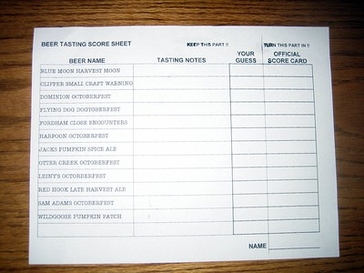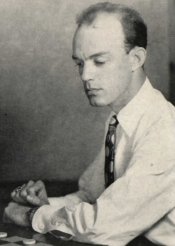The Checker Maven
The World's Most Widely Read Checkers and Draughts Publication
Bob Newell, Editor-in-Chief
Published every Saturday morning in Honolulu, Hawai`i
Noticing missing images? An explanation is here.
The Sayings of Tom Wiswell
If you've read much at all of Tom Wiswell's writing on the art and science of checkers, you'll find gems of wisdom sprinkled liberally among the pages. A long-term friend of Tom's in New York City collected thousands of these pithy proverbs, and many of them can be found at the following two web sites:
Daily Speculations
Great Speculations (seems to be offline now
If you haven't visited these web sites yet, you really owe it to yourself to go there and learn a few new lessons of checkers and life from someone who mastered the art and science of both.
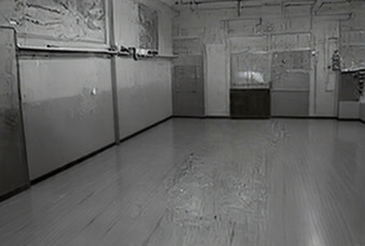
Tom Wiswell often played in a space similar to this one (this is not an exact rendition). Can you identify the location?
Click for the solution:
[Read More]Solutions and Followups from February, 2005

The feature problem for February was The Little Fooler by Tom Wiswell and Jimmy Ricca. Did it fool you? Click above to go back to the problem and see the elegant solution.
Also in February we started our Masked Man series. Could you identify the problemist and, just as importantly, solve the problem? Again, click above to go back, take one last look, and find out how well you did.
Didn't solve them all this time? Take heart. Last month's lean and mean two-by-two problems were harder than you might have expected. But don't give up. Try out this month's problems and watch your skills improve.
Publication Calendar
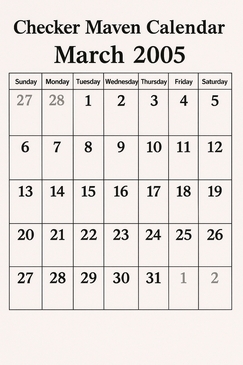
Now linked in the left column is our projected publication calendar, which will give you an idea of what's planned for upcoming Checker Maven editions. Of course, we need to make the disclaimer that the schedule is subject to change without notice at any time, and that accuracy is not guaranteed. We do want to have a few surprises now and then!
That said, feel free to browse the calendar and as always send us your comments and suggestions.
Who is Your Favorite Checker Book Author?

In the columns of The Checker Maven we rely a great deal on source material from our collection of classic checker books; in fact, you probably know we maintain an extensive and growing page of book reviews (see the link in the right-hand column).
Through the history of the game, many books have been written and many authors have tried their hand, some with great success and others with less spectacular results. And so, we'd like to ask our readers a question: who is your favorite checker book author?
In this survey, we've listed a few of the most prolific and well-respected authors. Which one do you enjoy reading the most? Enter your vote and then compare it with the choices of other readers.
(Editor's Note: As of 2025 old surveys are no longer on-line.)![]()
Introducing Marvin J. Mavin
We'd like to introduce you to Marvin J. Mavin, the hero of this webzine and the Captain and First Board player for the Detroit Doublejumpers, one of the leading teams in the Central Division of the National Checker League.

Marvin J. Mavin
Captain, Detroit Doublejumpers
Marvin is, of course, a leading professional in the highly popular sport-checkers world, and his team makes it to the playoffs more seasons than not. However, Marvin sometimes gets distracted by his lucrative promotional ad contracts, and he has been known to skip practice in order to shoot spots for his sponsors, Super Slick Shaving Soap and Belcher's Best Lite Lager. And as to that latter product, well, Marvin also sometimes misses practice to bend an elbow with a few of his buddies at the local watering holes. (We recommend that you not emulate this behavior yourself.)
Marvin was a top player on his grade school and high school teams, being named to the All-State squad three years running in his home state of New Jersey. He moved on to collegiate checkers, receiving a full-ride scholarship from the prestigious University of Champions in Mississippi. Following college he was a first-round draft choice of the St. Louis Switchers, who started him out with their Triple-A farm club, the Louisville Leapers of the Southeastern Checker League.
Marvin made the "big show" within a year, moving up to the Switchers, but became a free agent after his two-year contract expired, as he and the Switchers were unable to come to terms, with Marvin asking $12 million a year and the Switchers capping their offer at $8 million. The Doublejumpers then signed him on for $10 million per year plus performance based bonuses. The rest, as we all know, is history.
Join us in the columns of The Checker Maven later this month (March 2005), as Marvin pays a visit to a Detroit grade school and gives a lesson (or perhaps gets a lesson) on the "Fun Shot" in the Single Corner opening.
Checker Maven Score Sheets
You can get them here. Let us know what you think.
Oh...yes, these are for checkers, in case you were wondering!
A New and Original Online Play Site
We've come across what must be a fairly new site but one that has really captured our attention. It's called TurnPlay and it's simple, focused, and unique. This site has a lot of promise and we hope that it attracts its share of users. It is sure to appeal to the serious checker player.

TurnPlay is not a site for a casual head-to-head "pickup" game. It is instead a site which you can use to establish games with other players, who don't even have to be members themselves, and then engage in serious play backed by a game moderation system that works the way it ought to, including the use of correct PDN for moves.
In addition, the site allows for setup and play of an arbitrary position, something we have yet to see elsewhere.
Memberships are inexpensive at $20 per year although free guest memberships offer many of the important features, including unlimited play.
Check out the review and then check out the site. And if you like it, support them by joining.
Addendum
We did, by the way, also just now review another site which offers email turn-based play of something they believe to be checkers (although we beg to differ). We won't embarrass them, or us, by mentioning its name in The Maven, but the full review is here if you'd like to see for yourself.
Update
Missing screen shot images for about half a dozen sites on the review page have been restored as of 05 March 2005; our apologies for any inconvenience.
Computer Cheating in On-Line Checkers
We received this email today:
"I see a lot of people using a Cheating program for playing checkers on Yahoo. Where are they getting it from? Thanks."
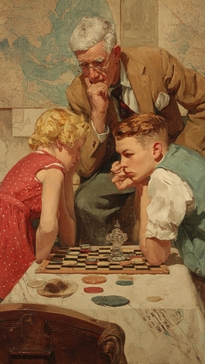
The writer is correct; there are a lot of cheaters that use computer programs to play their games for them; then they actually believe their "wins" and "high ratings" mean something.
It's pretty sad, isn't it? We can only hope that some day, these folks might get a life and realize that there is no shame in losing with grace and sportsmanship, and that relying on your own skills and accepting the results is what makes a true winner.![]()
Happy 90th Birthday, Mr. Richard Fortman!
Living checkers legend Richard "Dick" Fortman celebrated his 90th birthday on February 8, 2005. Mr. Fortman's checker career is nothing short of fabulous, as champion player, skilled analyst, and famed writer. You can send your birthday greetings to rlf111 at webtv.net.
Solutions and Follow-Ups from January, 2005
January's feature problem was Coffee and Cake, a classic from the early Willie Ryan days. Click on the link to review the problem and see the animated solution. Did you win it?
Also last month, we updated our review of the Blondie24 computer program. Click on the link, and then take a look at the animated game between Blondie and Simple Checkers to see how surprisingly well these two fare over the board.
And finally, we've done a complete rewrite of our article, So This Is Checkers?, as we've come across a lot of supplementary information about interesting checker variants both old and new.
The Checker Maven is produced at editorial offices in Honolulu, Hawai`i, as a completely non-commercial public service from which no income is obtained or sought. Original material is Copyright © 2004-2026 Avi Gobbler Publishing. Other material is public domain, AI generated, as attributed, or licensed under CC1, CC2, CC3 or CC4. Information presented on this site is offered as-is, at no cost, and bears no express or implied warranty as to accuracy or usability. You agree that you use such information entirely at your own risk. No liabilities of any kind under any legal theory whatsoever are accepted. The Checker Maven is dedicated to the memory of Mr. Bob Newell, Sr.
